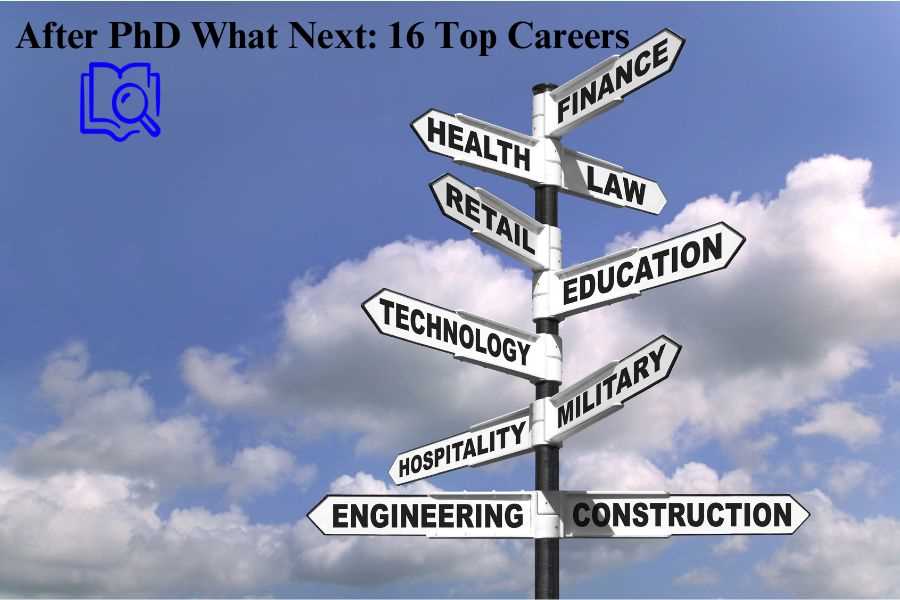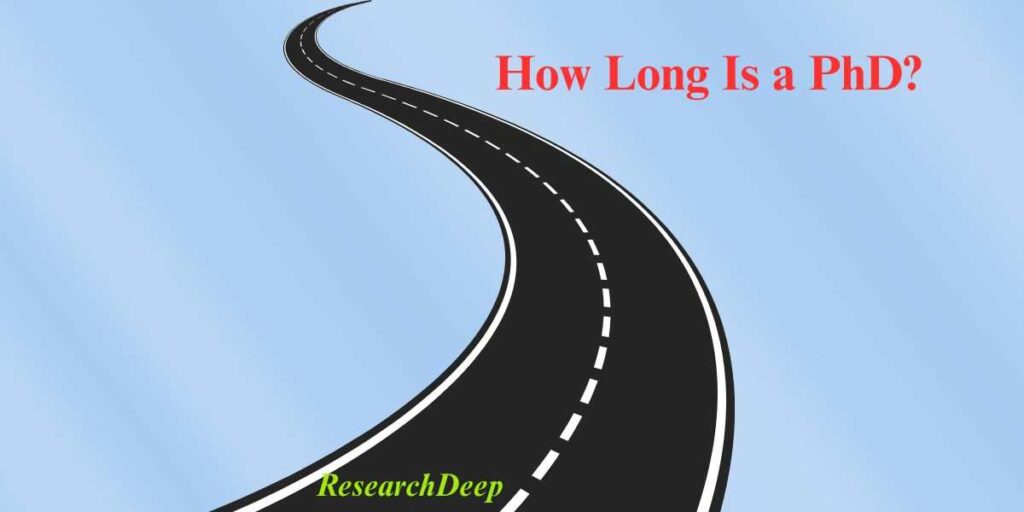Last updated on July 8th, 2025 at 06:14 am
After PhD What Next?
After earning a PhD, it’s natural to think about after PhD jobs. Remember, that you have completed the ultimate academic achievement and are well-equipped to consider various career paths before deciding on the right one.
In this article, I have recommended 16 highly-rated broad career fields with their distinct job profiles that are available to PhD degree holders, from traditional academia to diverse industry roles, each requiring careful consideration and strategic planning.
Table of Contents
Table: Post-PhD Careers and Relevant Skills
| Career Paths | Recommended Related Field |
|---|---|
| Traditional Academic Roles | Postdoctoral, Lecturers, Research Administration, Curriculum Development |
| Careers in the industry | R&D, pharmaceuticals, engineering, and environmental sciences. |
| Consulting Careers | Management Consulting Academic and Research Consulting |
| Government and Policy Roles | Science Policy Analyst, Working in Government Agencies, Research Funding and Grant Management |
| Entrepreneurship and Startups | Opportunities in Starting a Business, Creating a Tech Startup, Funding and Incubator Programs for PhDs. |
| Science Communication and Writing | Science Journalist or Writer, Public Relations |
| Healthcare and Clinical Roles | Biomedical Research Careers, Clinical Trials Management, Medical Science Liaison Roles |
| Nonprofit and International Organizations | Policy Analyst Roles, Researcher in the Nonprofit Sector, Working with NGOs |
| Higher Education Administration | Academic Program Manager, Admissions Officer Roles, Career Services and Student Support |
| Intellectual Property and Patent Law | Patent Examiner Positions, IP Consultant Roles, Patent Laws |
| Data Science and Analytics | Data Science Roles, Data Scientists, Machine Learning and Artificial Intelligence |
| Post-PhD Skill Enhancement and Certifications | Short-term Certifications, Skill Development for Non-academic Roles |
| Networking and Mentorship | Professional Network, Finding Mentors and Advisors Attending Conferences and Academic Gatherings |
| Work-Life Balance After PhD\Councillor | Managing Stress and Expectations, Setting Realistic Career Goals, Developing Resilience in Competitive Fields |
| Self-assessment and Long-term Planning Advisor | Identifying Personal Interests and Strengths, Setting 5- and 10-Year Goals, Using Self-assessment Tools |
| Leveraging Transferable Skills Coach | Communication and Analytical Skills, Problem-solving and Critical Thinking Abilities, Skills in Leadership and Project Management. |
1. Traditional Academic Roles
Postdoctoral Research Positions
- Purpose: Enhance research expertise, publish papers, and build networks.
- Typical Duration: 2-4 years.
- Goal: Often serves as a stepping stone toward faculty positions.
Postdoctoral positions are common for PhD graduates pursuing a research-focused career. These roles, typically spanning two to four years, help build a research portfolio.
Scholars engage in focused research under a senior mentor, often leading to publishing research articles in peer-reviewed journals.to further their studies and advance in their their careers.
Tenure-track Faculty Positions
- Scope: Many aspiring academics aim for a tenure-track position. In this position, scholars balance teaching and research, working toward tenure and long-term academic stability.
Lecturer and Teaching Roles
- Roles: Lecturer, assistant professor, or associate professor roles.
- Requirements: Involves teaching, conducting research, and publishing in academic journals.
Adjunct and Visiting Professor Roles
- Value: Advisors provide guidance to students, helping them to navigate their PhDs and expose them to possible future academic paths.
- Flexibility: Allows teaching at multiple institutions with less pressure to publish.
- Drawback: Often lacks the job security of tenure-track positions.
2. Alternative Academic Careers
Research Administration
These roles involve managing research projects, securing funding, and overseeing administrative tasks within universities or research institutions.
- Roles: University program directors, deans, or department heads.
- Skills Needed: Leadership, organizational skills, and understanding of educational structures.
Curriculum Development
PhDs with a passion for education may thrive in curriculum development, shaping course content and learning objectives.
Research Management and Development
- Focus: Overseeing research projects, handling grant applications, and managing academic resources.
Science Communication and Public Outreach
- Opportunities: Science journalism, public relations, or educational outreach.
- Goal: Make complex academic topics accessible to a broader audience.
3. Industry and Corporate Careers
PhDs in industry roles bring specialized knowledge and research skills. This transition often requires learning business-oriented skills.
While industry careers offer better compensation and work-life balance, they may involve less academic freedom compared to academia.
Research and Development (R&D)
- Roles: Positions in biotechnology, pharmaceuticals, engineering, and tech.
- Skills: Problem-solving, analytical thinking, and technical skills.
- Value: PhDs can work in research-intensive roles in sectors like pharmaceuticals, engineering, and environmental sciences.
These roles demand strong analytical skills, problem-solving skills, and interdisciplinary knowledge.
Data Science and Analytics
- Growing Demand: PhDs in data science use analytical skills to extract insights from data across various industries.
- Requirements: Familiarity with programming languages like Python or R, and statistical expertise.
4. Consulting Careers
Management Consulting
PhDs are valued in consulting for their problem-solving abilities. They may work on complex business problems across industries.
Academic and Research Consulting
Roles: Offer strategic guidance for business problems, often in specialized sectors like healthcare, tech, and finance.
Skillset: Consulting demands adaptability, strong communication skills, and strategic thinking.
5. Government and Policy Roles
Science Policy Advisor
PhDs interested in public policy can work as analysts, bridging the gap between scientific research and policymaking.
- Focus: Evaluate and create policies for governmental or non-governmental agencies, especially in science, health, and technology.
- Skill Requirements: Strong communication, research, and critical thinking skills.
Science Advisor
- Purpose: Advise government officials on science and technology-related issues.
Research Funding and Grant Administration
- Role: Work with agencies that fund research, assess grant applications, and support research initiatives.These roles focus on evaluating and managing research grants to ensure they align with governmental or organizational goals.
Working in Government Agencies
PhDs can work in agencies like the NIH, providing expertise to guide science-related policies.
6. Entrepreneurial Ventures
Opportunities in Starting a Business
PhDs may choose to launch their ventures, leveraging their expertise to create niche products or services.
- Possibilities: Launching a startup related to your field of study, often with technology, software, or biotech focus.
- Support: Look for incubators or funding for science-based startups.
Creating a Tech Startup
With the right skill set, PhDs can enter tech entrepreneurship, creating innovations within software, biotech, and more.
Funding and Incubator Programs for PhDs
Many incubators and funding programs specifically support scientists and researchers transitioning to entrepreneurship.
7. Consulting and Freelancing
Becoming a Science Journalist or Writer
PhDs can become science communicators, making complex information accessible to the public through journalism or blogging.
- Options: Offering consulting services in your area of expertise or freelancing in data science, writing, and more.
Working in Public Relations
Science communicators may work in PR for organizations, handling public messaging around scientific and technological advancements.
Grant Writing and Research Proposal Roles
Experienced writers can specialize in grant writing, a skill highly valued in both nonprofit and academic circles.
8. Healthcare and Clinical Roles
Biomedical Research Careers
PhDs in biomedical fields often find opportunities in hospitals, research labs, and private biotech firms.
Clinical Trials Management
This role involves coordinating clinical trials and ensuring compliance with regulatory standards.
Medical Science Liaison Roles
MSLs act as intermediaries between pharmaceutical companies and healthcare providers, sharing critical medical information.
9. Nonprofit and International Organizations
Policy Analyst Roles,
PhDs can help NGOs analyze policies, providing insight to influence social and environmental programs.
- Scope: Work on policy analysis, program development, and research for social impact projects.
Researcher in Nonprofit Sector
- Roles: Nonprofits often require expert researchers to evaluate projects and collect data on impact.
Working with NGOs
- Roles: PhDs can contribute their expertise to nonprofit organizations, addressing global issues like climate change and healthcare.
10. Higher Education Administration
Academic Program Manager
These managers oversee specific academic programs, from development to implementation.
Research and Evaluation
- Field: Nonprofits often need researchers to measure the impact of programs, requiring evaluation and data analysis skills.
Admissions Officer Roles
- Roles: Admissions officers guide prospective students, evaluate applications, and facilitate the admissions process.
Career Services and Student Support
- Scope: Career services roles involve helping students develop career plans, write résumés, and prepare for job interviews.
11. Science and Technical Writing
Science Journalism
- Focus: Writing about scientific developments for popular media, science journals, and online platforms.
Grant Writing and Proposal Development
- Specialization: Writing grant proposals for research funding, an in-demand skill across sectors.
Authoring Books and Educational Content
- Scope: Write textbooks, create online courses, or author specialized books in your area of expertise.
12. Intellectual Property and Patent Law
Patent Examiner Positions
PhDs can work as patent examiners, evaluating new inventions and ensuring they meet legal standards.
IP Consultant Roles
IP consultants guide companies on intellectual property rights, helping them protect valuable research and innovations.
Transitioning to Patent Law with Additional Qualifications
- Transition Path: With additional certification, PhDs in STEM can work in patent law or as intellectual property consultants.
13. Data Science and Analytics
Skills Needed for Data Science Roles
PhDs with a strong background in mathematics and programming may find data science a rewarding career.
- Scope: PhDs in STEM fields may pursue additional qualifications, allowing them to become patent attorneys.
Industry Demand and Growth for Data Scientists
- Roles: With data science growth on the rise, PhDs with quantitative skills are highly sought after across industries.
Machine Learning and Artificial Intelligence Opportunities
- Scope: ML and AI roles leverage data to create intelligent systems, a field ideal for PhDs with computer science or engineering expertise.
14. Post-PhD Skill Enhancement and Certifications
Acquiring New Certifications
- Scope: Certifications in project management, data analysis, or business fundamentals help PhDs adapt to new roles.
Skill Development for Non-academic Roles
Learning industry-specific skills enhances a PhD’s versatility and marketability in diverse roles.
Networking and Mentorship
- Role: Networking helps PhDs find mentors, job opportunities, and collaboration chances.
- Value: Mentors offer valuable guidance on career pathways and skill enhancement.
Finding Mentors and Advisors
- Role: Mentors provide guidance, sharing insights on career decisions and professional growth.
Attending Conferences and Academic Gatherings
Conferences allow PhDs to present research, meet peers, and discuss potential collaborations.
- Purpose: Build connections, learn about industry trends, and discover career opportunities.
15. After PhD Councillor
Managing Stress and Expectations
- Value: Transitioning from a PhD requires resilience and strategies for managing stress in new work environments.
Setting Realistic Career Goals
- Roles: Setting clear, attainable goals helps recent PhD graduates navigate career decisions.
Developing Resilience in Competitive Fields
- Purpose: Building resilience enables PhDs to thrive in competitive and high-pressure career fields.
Self-assessment and Long-term Planning
- Roles: Identifying personal nterests and strengths guides PhDs in choosing roles aligned with personal goals.
Setting 5- and 10-Year Goals
- Value: Long-term planning helps PhDs envision a clear career trajectory, even in evolving fields.
- Using self-assessment tools: Tools like career assessments aid PhDs in identifying strengths and preferences.
16. Leveraging Transferable Skills
Communication and Analytical Skills
- Value: PhDs possess strong communication skills, essential for explaining complex topics to varied audiences.
Problem-solving and Critical Thinking Abilities
- Roles: These skills allow PhDs to tackle challenges in research, consulting, and strategic planning roles.
Skills in Leadership and Project Management
- Scope: Managing projects equips PhDs for team leadership and organizational roles.
FAQs
Can PhDs easily transition to industry roles?
Yes, though some skill adaptation may be required, PhDs have transferable skills highly valued in industries.
Are postdoctoral positions required for academic careers?
Postdoctoral positions are common but not mandatory for academic careers. Some fields require direct academic roles instead.
Conclusion
Completing a PhD is a significant achievement that opens up a vast array of professional and academic opportunities. From research positions in academia and industry to roles in policy, consulting, and leadership, the paths available post-PhD are diverse and highly rewarding.
While the transition can be challenging, especially when facing choices beyond academia, the skills developed during a PhD—critical thinking, in-depth analysis, and project management—are assets that can be leveraged in numerous fields.
By identifying your strengths, staying adaptable, and keeping a network of peers and mentors, you can navigate this new phase with confidence. Embrace the journey ahead; it is, after all, the continuation of your passion for learning and making an impact in the world.




